Epic Mickey: Rebrushed (PC) Review
By Az Elias  23.09.2024
23.09.2024
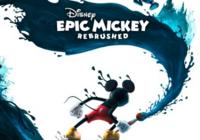
2010's Epic Mickey on Wii was quite the delight for fans of the famous Mickey Mouse and Disney in general. In Wasteland, forgotten and discarded characters from Walt Disney's old creations were given new life, exploring another world outside of that from the one Mickey is used to - the one in which he became a superstar and is known the world over. The original game suffered from some issues - namely a poor camera - but Epic Mickey: Rebrushed aims to rectify those complaints, with a new engine and visual overhaul present.
After Mickey enters a mysterious mirror in his bedroom, the curious mouse sees the mighty wizard Yen Sid putting the finishing touches to a craft on his table. Mickey spies an opportunity to play around with the paint after Yen Sid's departure, but he only succeeds in ruining the art… and unknowingly destroying an entire world in the process. Escaping back through the mirror before being caught, we see the years tick by as Mickey becomes the household name synonymous with Disney, only for him to be pulled back into the mirror by a menacing shadow.
Now in Wasteland, Mickey learns this is the place that he accidentally brought distress to following his antics with the paint in the past. Equipped with a magical paintbrush, he aims to rectify the mess he has caused, helping the citizens with their problems and restoring the land to its former state.
As a predominantly 3D platformer, Epic Mickey: Rebrushed strikes a few familiar chords with a couple of games in particular: Banjo-Kazooie and Super Mario Sunshine. Like Banjo, points of interest are often shown upon entry to a new area, and interactions with characters both familiar and unknown are commonplace. It is only natural for the spraying around of paint and thinner to evoke those Mario Sunshine vibes, and the method in which their usage is applied is amusing to say the least.
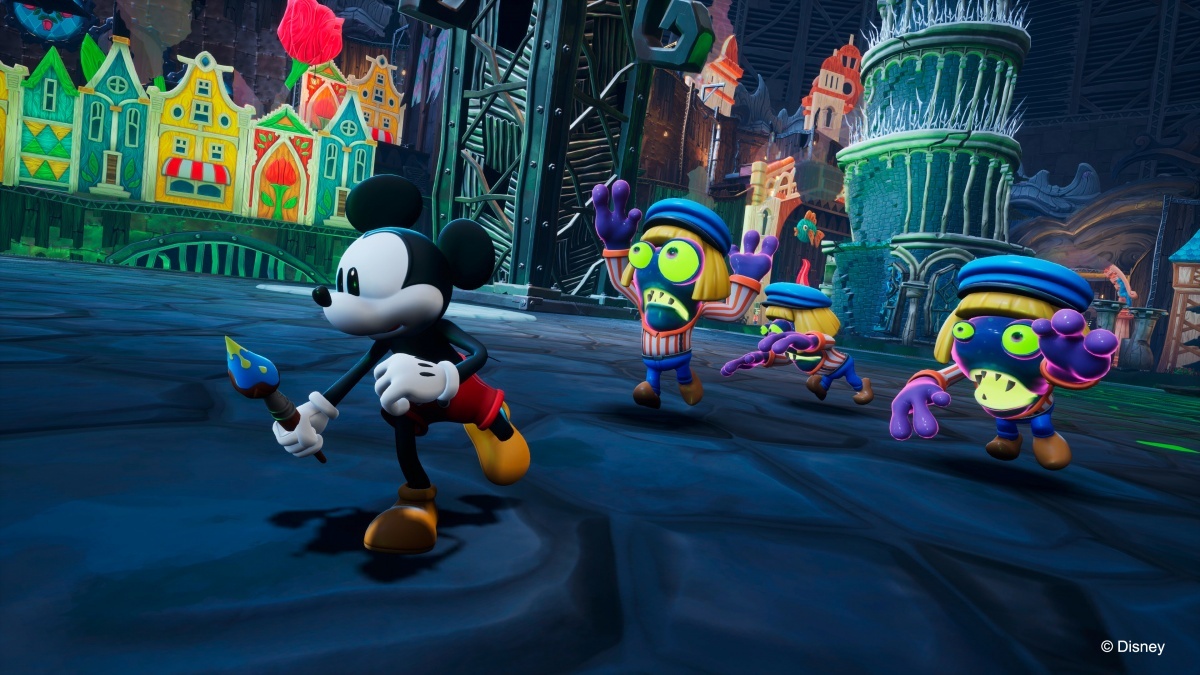
Across the various regions of Wasteland, Mickey can both paint and erase parts of the levels, including buildings, the ground, and objects. In doing so, he creates new platforms to reach greater heights or inaccessible areas with paint, or removes parts to make enemies fall or uncover hidden chests and collectibles with thinner. Epic Mickey is littered with secrets that contain pin badges and concept art, and these are often the reason for exploring each stage fully.
Generally, each area that Mickey travels through requires taking care of a few character requests. Some of these are necessary to progress to the next level, while others are side activities that grant rewards, or may even affect other parts of the game down the road. Epic Mickey does have the problem of being a little basic and repetitive in its quests, but it isn't anything that is uncharacteristic of the genre - it is simply a little outdated.
From rounding up bunnies to fetch quests that require travelling back and forth between areas, there is some monotony involved when it comes to these gigs, but this goes hand in hand with the broader narrative of Mickey attempting to make up for his earlier screwups and helping the residents in their plights. Whether he successfully completes certain jobs will play into what can happen in future sections, where more enemies may appear otherwise, making some bits a tad more difficult.
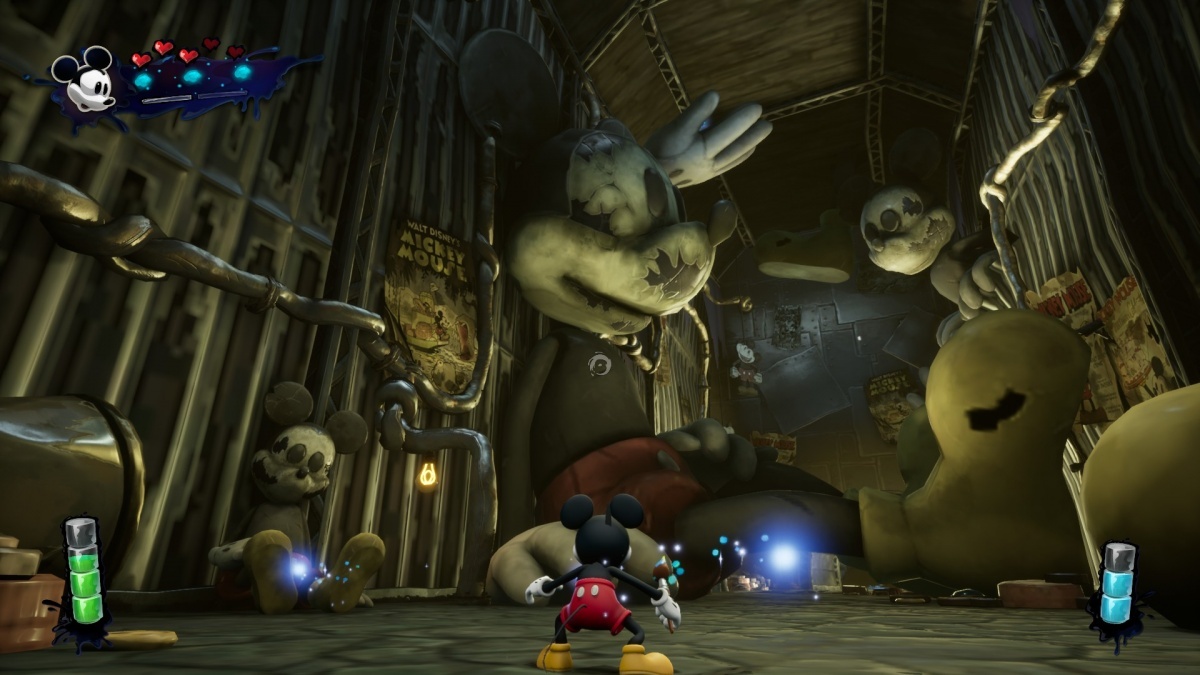
The decision to use paint or thinner applies to foes, too, which adds a tactical element to gameplay, but plays into which ending is obtained upon beating the game. This links with the side-questing outcomes, tying into what Mickey wants to ultimately achieve in Wasteland. Using paint on fiends makes them friendly, while thinner completely erases them. This strategic component comes to the fore in boss battles, where defeating them with one or the other determines how they show up later. In addition, the way in which a boss is overcome dictates whether the gauge for Mickey's paint or thinner is upgraded - so playstyle factors must also be weighed up in these key battles.
Guardians will be obtained at an early stage, but although they can help with defeating enemies, their use is hardly beneficial, and the game can quite easily be completed without ever needing them. It is quite common to forget they are even a thing, so a more important use for them could have helped to keep them prominent.
Breaking up the 3D stage gameplay are side-scrolling platformer segments that retrace some of the popular cartoons from Mickey's past. These are about as basic as 2D levels go and come across as a bit of a disappointment in terms of what can be gotten out of them. They are a means to getting to the next area and then they can be skipped going forward.
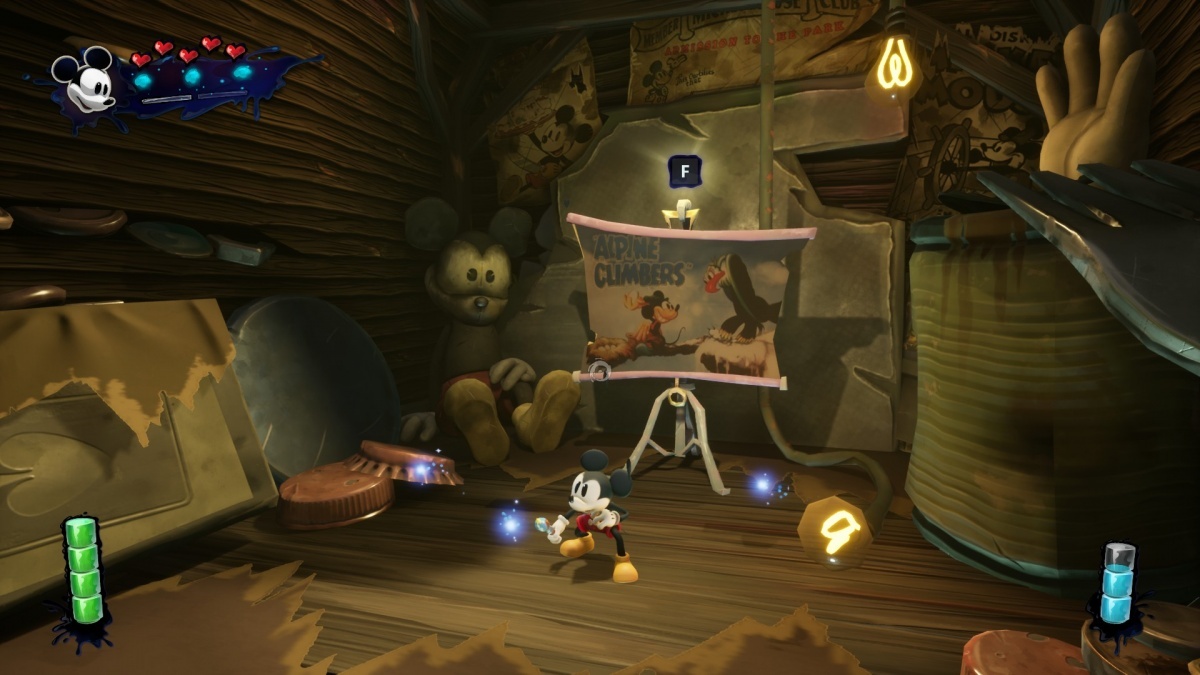
Epic Mickey's darker tone compared to most other Disney games is refreshing, but it isn't as extreme as it might initially seem. The lack of vibrancy in areas, coupled with some of the more dull and boring stages, can have the unfortunate effect of feeling a little depressing - but perhaps that is part of the point.
Without having played the original Wii version, it cannot be compared to directly here, but there doesn't seem to be any major camera issues to complain about in this remake, aside from a few expected ones here and there. It must be said that there are a handful of glitches that can occur, though, with Mickey getting trapped on objects now and then. The ability to sprint is welcome, but there isn't much requirement for the ground pound, although the dash mechanic is useful for dodging.
As a final point, the lack of voice acting is apparent. The cartoon-like scenes that occur throughout the game are visually pleasing, but there isn't always enough time to read the subtitles before they disappear. It can't help but be thought that the story could have been enhanced with Mickey's familiar voice, and his interactions with Oswald the Lucky Rabbit, Pete and the Mad Doctor would have benefitted, too.
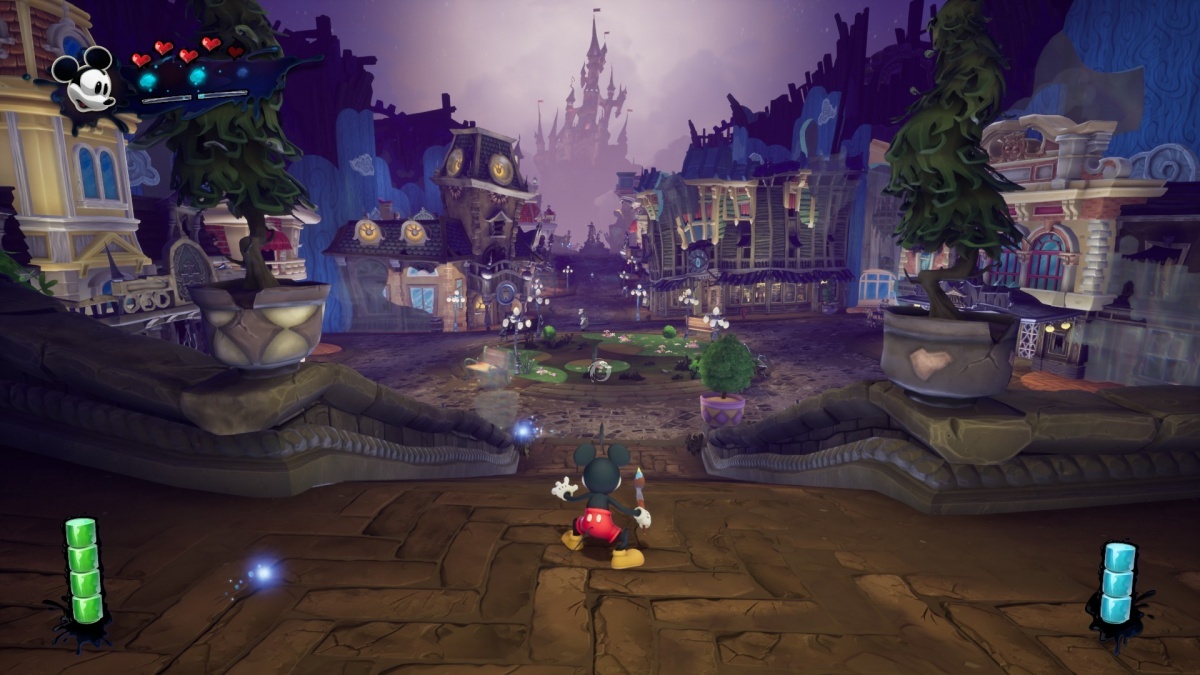
Cubed3 Rating
Very Good - Bronze Award

Epic Mickey: Rebrushed will be a fun time for any 3D platformer and Disney fan, with all sorts of references to the past. It is a fascinating game that brings people deeper into the characters and worlds that Walt Disney created in his early days, and will be worth exploring Wasteland again for those that played the original Wii version thanks to the improvements made mechanically and visually. This is still a rather basic platformer that treads the line of tedium due to outdated fetch quests, and voice acting could have really benefitted the story scenes, but there is a great charm to this game, despite the darker tone, that will appeal to many.

![]() 7/10
7/10
![]() 0
(0 Votes)
0
(0 Votes)
 Out now
Out now  Out now
Out now  Out now
Out now  Out now
Out now Comments
Comments are currently disabled

 Sign In
Sign In Game Details
Game Details Subscribe to this topic
Subscribe to this topic Features
Features






 Top
Top

